Support Our Troops: Stop Climate Change!

NEWS JUNKIE POST
Dec 29, 2010 at 9:13 amFollowing up on Gilbert Mercier’s Obama’s Afghan Strategy For A War That Can’t Be Won I would like to offer two other perspectives on the Afghan War, the first much more microscopic, the second more macroscopic.
To begin I would like to introduce you to the too little known Afghanada, “an award-winning Canadian radio drama series” that “gives us a grunts-eye perspective of the war in Afghanistan.” Then I want to discuss how the war is far more futile than even Gilbert Mercier suggests because of one of the underlying causes for the disintegration of Afghanistan, climate change.
Afghanada. What can I say? It’s good. It’s very good, and totally about how the boots on the ground experience the war.
Based on actual events on the ground in Kandahar, each week’s episode takes the listener on an intense and compelling auditory journey, an unadorned reflection of the very real life and death situations Canadian soldiers face every day in Afghanistan.
For a taste you can can check here and here, to listen to the next episode here, and the entire series is available on itunes here.
Caution: the ‘you-alls’ (aka Americans) do not always come out looking that good, but then neither do the Canadians. Or anyone else for that matter. It’s kind of like real life that way. Enough said.
Hydropolitics: climate change and the Afghan War What follows is an abridged version of a post I did over a year ago. I realize NJP wants original content, but I think this is relevant, important and timely enough to warrant repeating, not to mention that I have removed and edited some of the more climate related detail to focus on the politics. Those wanting the more detailed picture should check out the original.
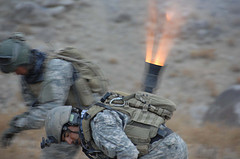 Like all tragedies, the most terrible thing about the Afghan War is the utter futility of the suffering. Our determination to do nothing meaningful about anthropogenic climate change means that none of the sacrifices by any of those involved in Afghanistan are going to accomplish anything, not unless we honour those sacrifices by doing our part.
Like all tragedies, the most terrible thing about the Afghan War is the utter futility of the suffering. Our determination to do nothing meaningful about anthropogenic climate change means that none of the sacrifices by any of those involved in Afghanistan are going to accomplish anything, not unless we honour those sacrifices by doing our part.
We all know about the war in Afghanistan, or think we do. Those who follow the news will know that the “trouble” is predominantly in the south and southwest, particularly the provinces of Helmand and Kandahar.
Do we wonder why that is? If “the problem” is government corruption, or religious extremism, or nationalism, or tribalism, or … why those areas in particular? why not all over the country?
The reality of the Afghan War is complex, dynamic, and nuanced. For a start, which Afghan War? in the West we generally mean the invasion and occupation by Coalition forces that began in 2001, but how do you clearly separate that out from the longer Civil War? and how is that influenced by other former conflicts? never mind the regional conflicts and power dynamics?
Obviously all of the factors mentioned play a role, as do many others. No social dynamic like war ever boils 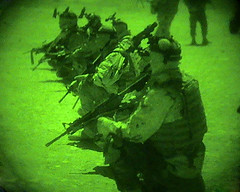 down to a single factor, although relatively simple causes can precipitate and/or be driving a conflict, and perhaps even dominate for a period. However, how it plays itself out is inevitably going to involve all of the other factors.
down to a single factor, although relatively simple causes can precipitate and/or be driving a conflict, and perhaps even dominate for a period. However, how it plays itself out is inevitably going to involve all of the other factors.
What I offer here is not meant to try and dismiss those factors and replace them with just one, but rather provide some insight into what one of the fundamental factors is. Why the south? One word. Water.
While most of Afghanistan is naturally fairly arid, the The Helmand River basin is particularly so, and in the past few decades it has been suffering severe deforestation and desertification. Predictably, as a consequence crop yields are in decline; both total yields and per capita production. Less water means less food. Less food means some starve.
As people become increasingly desperate they turn to whatever they think may allow them to provide for their families today; overgrazing, overdrawing water supplies, illegal logging, the drug trade, corruption, religious and political extremism; anything that might work.
At best some of these choices do nothing to help fix or at least stop the problem from getting worse. Most of them do make the problem worse. They may allow the people to get through today, but it makes tomorrow even worse than it might have been and hence drives even more people into making the same desperate choices, and so on.
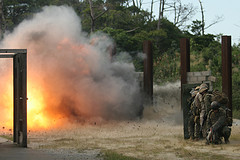 Afghanistan is not some isolated oasis sheltered from climate change. Like the rest of the world it has been progressively getting warmer. And of course as we predict for most arid regions in the world, the consequence of climate change is declining precipitation. Mean annual rainfall has been dropping for decades.
Afghanistan is not some isolated oasis sheltered from climate change. Like the rest of the world it has been progressively getting warmer. And of course as we predict for most arid regions in the world, the consequence of climate change is declining precipitation. Mean annual rainfall has been dropping for decades.
From government corruption to religious extremism, all of the factors mentioned play a role in how the Afghan War is playing itself out. However many of those factors are rooted in desperate people making desperate choices, and that arises when people see no future for themselves or their children. Desperate people will do whatever they think they have to.
So what does the future hold? what are the chances that elections and troop surges will make a difference?
Not surprisingly, since we in the West are apparently determined to do nothing meaningful about climate change, the prognosis is that the situation in Afghanistan is only going to get worse. In fact much worse than I have suggested so far for at least five other reasons.
First, both the Helmund and the Kabul Rivers originate from the snows and glaciers of the Hindu Kush Mountains. As these disappear due to climate change the flows of the rivers decrease ie there will be even less water than the mere decrease in rainfall suggests.
Second, the problem is global, and just as these rivers will be drying up, so will almost all of the major rivers of Asia, putting a billion people under conditions from food stress to outright famine (here and here). As such the food aid and imports that Afghanistan currently receives will disappear.
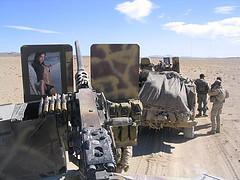 Third, these same rivers are not simply sources of water for irrigation, but also act as sources of hydro-electric power. As such the loss of food and collapse of infrastructure will go well beyond that caused by the simple lack of water for irrigation.
Third, these same rivers are not simply sources of water for irrigation, but also act as sources of hydro-electric power. As such the loss of food and collapse of infrastructure will go well beyond that caused by the simple lack of water for irrigation.
Fourth, while not yet as progressed as the South, the rest of Afghanistan is basically on the same path. The stabalizing supports that the rest of the country is currently contributing will disappear as the other provinces have to deal with their own difficulties.
Fifth, Pakistan receives some of the waters of the Kabul River, and Iran from the Helmand. Like everywhere else they are and will be experiencing the same stresses. If Afghanistan draws more water from the rivers it will escalate tensions with these powerful neighbours who will themselves be desperate for every drop.
Probably a sixth one should be our cluelesness as to the real socio-political dynamic. Just a couple of years ago we were celebrating the impact of climate change on Afghanistan because it would make for a poor poppy harvest. Overlooking the fact that it would make for a poor harvest generally, hence driving more people to desperation.
Whether the problem began as climate change alone which then led to 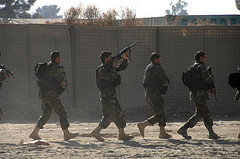 logging and overexploitation of land and water, or if the overexploitation came first, or whether they ran in parallel, is now academic. The fact remains that:
logging and overexploitation of land and water, or if the overexploitation came first, or whether they ran in parallel, is now academic. The fact remains that:
- even if there had been no overexploitation of any form these regions would still be in trouble now because of climate change;
- even if we managed somehow to stop all of the overexploitation immediately the problem would continue to get worse because climate change would continue to drive it;
- the increasing aridity will push more and more people to make desperate, ultimately self-defeating choices, that will in turn accelerate the process.
What we are seeing now is that the more ecologically, politically and socially brittle regions of the planet devolve into violence and chaos first. There is a metaphoric disassembly line operating. As marginal regions become essentially uninhabitable “failed states”, other areas will degrade to marginal in turn, and on up the line (as discussed previously). As each begins it’s decline the social positive feedbacks will tend to accelerate the process.
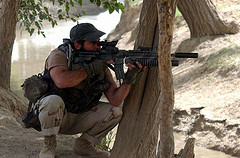 Just look at Afghanistan, or Somalia, or Darfur if you want to understand what climate change really means for the future. Certainly each region is affected by it’s own unique circumstances and culture, and the particulars of who winds up shooting who and the specific “why” will vary from place to place.
Just look at Afghanistan, or Somalia, or Darfur if you want to understand what climate change really means for the future. Certainly each region is affected by it’s own unique circumstances and culture, and the particulars of who winds up shooting who and the specific “why” will vary from place to place.
Two things that will not vary are:
- that ultimately it comes about because desperate people are making desperate choices. Choices they would not make if they had real options and opportunities.
- they do not have those opportunities because we in the industrialized world are making equally self-defeating choices, although ours are to preserve our luxuries rather than to attempt to meet our basic needs, at least for now.
So we can continue to send men and women to Afghanistan to kill and maim and to traumatize, and to be killed and maimed and traumatized themselves. What their sacrifices, and of the Aid workers and other 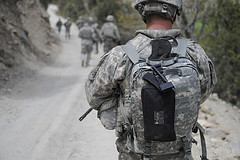 development workers, and most particularly of the people of Afghanistan, actually mean is up to us.
development workers, and most particularly of the people of Afghanistan, actually mean is up to us.
We caused the problem, continue to cause it, and they are being made to pay for it.
Are they sacrificing to help build a better, more just and equitable future? Or are they being sacrificed so that we do not have to live in a more just and equitable present?
A just and equitable present where we get our fair share rather than the gluttonous excess which we have been indulging ourselves with? Which are we going to choose? Which do you choose?
We give our consent every moment that we do not resist.
Image Credits:
Combat Operations by ussocom_ru
071226-A-1724D-017 by ussocom_ru
071224-A-8378C-093 by ussocom_ru
United Fight: Combat Medics Provide Aid, Support to PRT Mission by DVIDSHUB
Related Articles
- March 7, 2011 Overpopulation, Climate Change, Food Crisis, War: The Horsemen Of Apocalyptic Capitalism
- November 20, 2013 Fragmentation of News and Causes: The Urgent Need to Think Globally
- August 22, 2021 Forget Wars on Covid and Terror: War on Climate Collapse Is the Only War of Necessity for Human Survival
- March 8, 2010 Democracy Now! For Ecological Sustainability
- February 26, 2013 Kerry and Hagel: Can Two Vietnam Vets End the War in Afghanistan?
- October 28, 2012 The Pulse of Climate Change


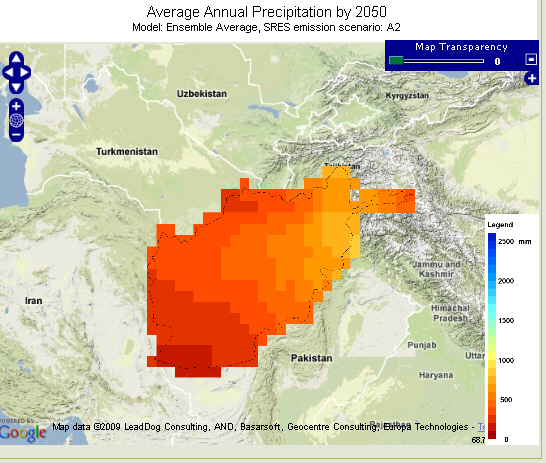











You must be logged in to post a comment Login